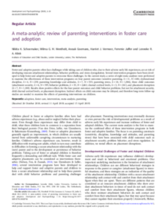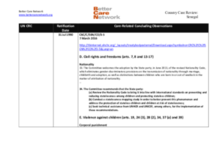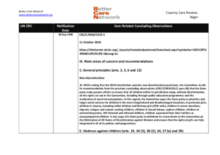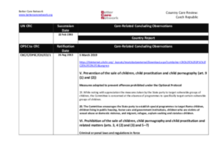Displaying 201 - 210 of 654
This paper used the latest judgment documents from the court as a new data source, and identified the key nodes and trafficking paths by using a series of network indicators to enhance the public’s understanding of the crime mechanism of child trafficking.
Written from a multidisciplinary and international perspective, this article outlines the place of adoption in the child protection system, as well as its core elements of permanence and stability.
This chapter from the Handbook of Population reviews demographic research focusing on the adoption of children.
In the current study, a series of eight meta-analyses were performed to examine the effectiveness of intervention programs to help foster and adoptive parents to overcome challenges on four parent outcomes, three child outcomes, and placement disruption.
This country care review includes the care-related Concluding Observations adopted by the Committee on the Rights of the Child and the Committee on the Rights of Persons with Disabilities.
This country care review includes the care related Concluding Observations adopted by the Committee on the Rights of the Child and the Committee on the Rights of Persons with Disabilities as part of its examination of Niger's initial reports, as well as other care-related concluding observations, ratification dates, and links to the Universal Periodic Review.
Empirical research with social workers exploring their understandings and use of codes or ethical theories in practice remain underdeveloped in the UK. This article, based on the British Association of Social Work commissioned Enquiry into the role of the social worker in adoption with a focus on ethics and human rights, provides an important contribution in this context.
The first aim of this study was to find subgroups of adult international adoptees based on common risk and protective factors using a latent class analysis. The second aim was to examine whether the identified subgroups differed in outcome variables such as life satisfaction and psychological adjustment.
This paper draws on an evaluation of the effectiveness of the Nurturing Attachments groupwork programme provided by AdoptionPlus for adoptive families in England. The Nurturing Attachments programme, informed by Dyadic Developmental Psychotherapy (Hughes, Golding & Hudson, 2015), was developed to help foster and adoptive parents strengthen their relationships with the child and support children who had experienced developmental traumas.
This country care review includes the care-related Concluding Observations adopted by the Committee on the Rights of the Child and the Committee on the Rights of Persons with Disabilities. The Committees' recommendations on the issues relevant to children's care are highlighted, as well as other care-related concluding observations, ratification dates, and links to the Universal Periodic Review and Hague Intercountry Adoption Country Profile.




